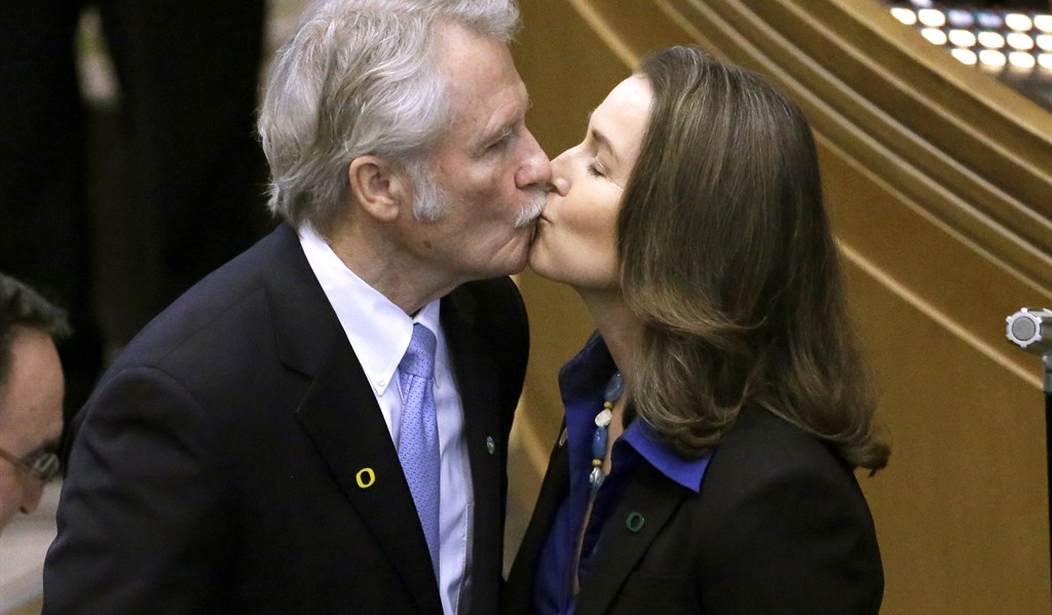Come over here, she beckoned, Let me whisper in your ear. If you make me first lady and hire me as “clean energy adviser,” I’ll ignore the 20 years between us.
Last Friday afternoon, 67-year-old Gov. John Kitzhaber (D-Oregon) announced his resignation. He and his 47-year-old clean energy consultant/lover Cylvia Hayes will no longer be taking romantic strolls through the manicured gardens of Mahonia Hall. Nor will they be engaging in late-night pillow talk sessions on “energy” at the Tudor-style governor’s mansion.
Two days before resigning, Kitzhaber distributed a defiant press release to announce that he would not be resigning. Reading between the lines, his message was: I don’t care that my constituents—the majority of whom are Democrats—feel that I’ve betrayed their trust. I’m standing by my green energy gal pal.
Then the New York Times did a story, and it was not flattering. Rule of thumb: if you’re a Democrat and even the New York Times thinks you’re a scallywag, beware.
Kitzhaber is not Bill Clinton. He’s not as charming. Nor is he as subtle—choosing to flaunt his personal life in the public eye instead of keeping it behind a closed bathroom door. Third—and most notably—he accomplished next-to-nothing while in office. After eight years, Clinton could at least stroll away from the White House and take credit for occasionally reaching across the aisle on meaningful initiatives like welfare reform and, with some help from Reagan’s policies, leaving Americans with good jobs.
Kitzhaber sat in Oregon’s executive seat for four years longer than Clinton sat in the Oval Office and has little to show for it. Oregon is a blue state. Kitzhaber didn’t have to try that hard to please voters. But he didn’t try at all. Democrats began complaining that Oregon was falling behind the rest of the country while the governor used his office for personal pleasure and political gain. For example, Oregon ranks 40th on unemployment and 41st on student performance in comparison to other states.
Gov. Kitzhaber was re-elected to his fourth term in office last fall, largely because Oregon’s voters preferred electing a Democrat to a Republican. Perhaps Oregonians have learned their lesson the hard way: voting blindly along party lines is not always in your best interest.
Recommended
Local papers such as the Williamette Week and The Oregonian did some stealth work and found that Kitzhaber was exploiting his position of power to help his fiancée—without helping his constituents. When he refused to step down, the New York Times ramped up the heat by bringing his malfeasance into the national spotlight.
“Clean” Can Be Dirtier than “Crude”
Politicians can learn a valuable metaphorical lesson from Kitzhaber’s errors. You see, much of the current renewable energy technology is rather dirty—and not in a playful, coquettish way. So-called “clean” energy hurts poor people—who are disproportionately young (one-in-five Millennials lives in poverty)—by raising their energy prices and reducing their ability to trust government leaders.
The Wall Street Journal recently noted that residential electricity prices are up 39%. This is in part due to the fact that taxpayers are being forced to subsidize the higher cost of “clean” energy like solar, wind and electric.
At present, most renewable technology is not able to compete with petroleum or coal without substantial help from taxpayers. For example, the Wall Street Journal recently noted that electric car batteries would have to become about 10 times more efficient than they are today in order to compete with gas-propelled cars.
Oil companies like Exxon make a small profit in comparison to the billions they pay every year in taxes and the hundreds of thousands of well-paying jobs that they create. In 2012 alone, Exxon posted 12.1 billion in U.S. taxes and 102.1 billion in worldwide taxes. Other than higher energy prices, what are renewables giving back to the community in return for the boost they are receiving from taxpayers?
When MSNBC host Melissa Harris-Perry asked Attorney General Eric Holder to “quack” on national television, it was a universal turn-off. There’s only so much reckless flirtation that Americans will tolerate from public figures and Kitzhaber is now in the same camp as Harris-Perry.
If a male politician talks dirty back to a female clean energy consultant, she can sue him for sexual harassment. Or, she can savor his sweet nothings while making off with taxpayers’ money—and then kill his career.
























Join the conversation as a VIP Member